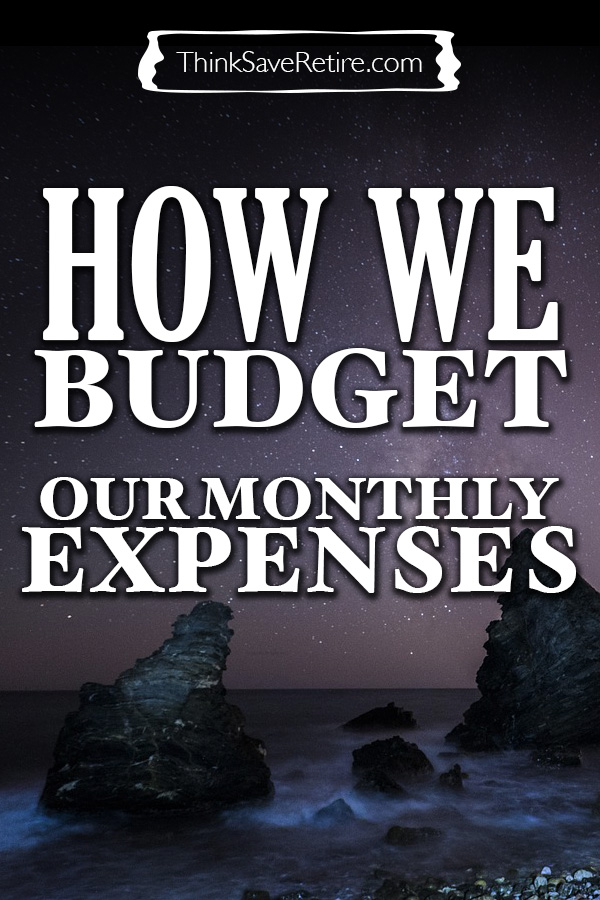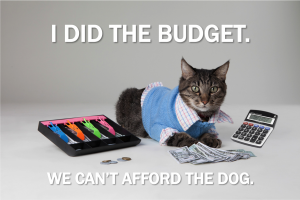How we budget our monthly expenses
Our budget is designed around a reasonable expectation and the minimalism that took a firm grasp over our lives last year makes the acquisition of useless crap virtually nonexistent.

About midway through 2014, we adopted our new "fuck this" attitude about working until 60 and decided to achieve financial independence as early as possible and retire before I hit the big four-oh three-six. Since then, our household has become much, much more stringent with our finances, and our budget has been instrumental in keeping us on the straight and narrow.

Budgets aren't all that sexy (lots of numbers and stuff), but they can be effective if designed appropriately for your life and goals. If you ever cheat your budget, all you're doing is cheating yourself...or to be more specific your future self.
Don't cheat your future self. He or she will hate your guts for it. If time travel were possible, your future self might travel back in time to punch you in the face. Right now. And let's be honest - who really wants a black eye from our future selves because our current selves decided to be jackasses and cheat on the budget?
Okay, let's get down to business. My wife and I budget virtually every one of our expenses every month. We know exactly what we bring in and exactly what we spend...and on what.
While some subscribe to the "don't buy shit" budget, which basically means nothing is bought outside of absolute necessities, we haven't adopted this philosophy yet. We want to know exactly how much we are spending and where our money is going...and budgeting just makes that whole exciting process so much easier. If we ever need to cut costs, a quick inspection of our budget can easily pinpoint where we might be able to cut back a bit.
How we budget

I'll be honest - my wife is the meticulous one. She's the rocket scientist engineer with a masters degree in aeronautics, so I generally let her design the budget and work the numbers so everything adds up in the end. It's just easier on both of us that way. :)
Our budget is designed around a reasonable expectation of what our lives should cost every month. We do not feel constrained by our budget because, quite frankly, neither of us buy "stuff" anymore. The sensibility that took a firm grasp of our lives last year makes the acquisition of useless crap virtually nonexistent.
How does our budget actually work?
We have a simple Excel spreadsheet that gets updated nearly every day. We save all receipts for every purchase. We formerly used Mint to help visualize our purchases but have since upgraded to Personal Capital, a much more robust application for financial visibility.
Our spreadsheet is broken down into standard monthly costs (like mortgage and car payments), variable monthly costs (utilities, cell phones, etc), standard yearly costs (our dogs, backyard pool, car maintenance and insurance, etc), food costs and "fun money". We also budget for health-related costs, like prescriptions, gym memberships, bottles of Tylenol, etc.
What the hell is fun money? Our fun money pot is money that we can use to spend on things outside of our standard monthly or yearly costs. If I want a new jacket, for example, this would come out of my fun money. "Don't buy shit" people effectively don't have this particular budget category.
We do not put very much into our "fun money", and we also do not let any unused money roll over from month to month in an effort to keep us from making expensive purchases, even if they are technically budgeted for within our "fun money" pot of cash. Instead, any unused fun money at month's end goes straight into our savings account for the Sedona, AZ townhouse that we plan to invest in. The Sedona investment property is more important to both of us than buying new jackets Airstream that we intend to buy.
How do we account for larger purchases that do not fall nicely into one of our regular monthly categories, but surpass the cost of a single month's budget? Glad you asked! If there is a more expensive item that my wife and I need, then we make a new budget item for it and redirect some of our fun money into that pot and track it separately. Here, money can accumulate from month to month, and both my wife and I both need to agree that the purchase is important enough to break out into a separate budget line item.
It's all in the name of budgetary transparency. It also keeps us honest about the things that we are buying. If we still want it after a few months of saving, then we can be more certain that it is a reasonable purchase.
It is important to note that not every freaking dollar that we make goes into our budget every month. Yeah, we're complex like that.
Both my wife and I work full time, but we fund our budget every month by using just one of our two salaries (mine). We (and by "we", I mean my wife) did the math and we use about 91% of the money from my salary to fund the budget. Our goal is to get this number down to something closer to 80%. Whatever money is left over from my salary after our budget is completely funded (in other words, the remaining 9%) goes into our short term savings account for the Sedona townhouse Airstream. My wife's entire salary gets contributed into our savings.
Why this works for us
Accountability. Knowing where our money goes is critical to maximizing our savings and pinpointing where we could probably cut back. For example, knowing how much we spent on gas in a month may encourage us to ride the motorcycle more rather than driving the pickup (the pickup was a mistake).
Starting point on which to improve. We never kept track of our spending to this extent before, so this budget gives us a baseline that can be used to perfect our monetary habits, especially as we roll closer and closer to jobless bliss.
Also, we don't necessarily spend everything that is budgeted. Yes, we have a certain amount to spend every month, but we think of our budget more as the upper limit of what can be spent, rather than what should be spent. The less we spend the more we save, and the more we save, the closer we get to achieving our long-term goals of financial independence and early retirement.
Oh yeah? Prove it!
We have a bunch of monthly budget statements published on the blog. Take a look through them for a look at the numbers!